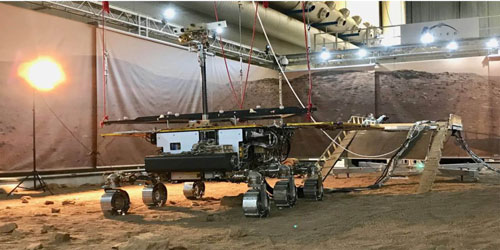A Russian-European mission to land a rover on Mars has been suspended due to sanctions over Moscow’s invasion of Ukraine and its “tragic consequences”, the European Space Agency said Thursday.
“We deeply deplore the human casualties and tragic consequences of the aggression towards Ukraine,” the agency said as it confirmed the sus-pension of the ExoMars mission.
The mission had been planned to launch in Sep-tember using a Russian launcher and lander to put the rover on Mars to drill into the soil, searching for signs of life. However, Russian space agency Roscosmos re-sponded to EU sanctions over the invasion by sus-pending launches and withdrawing more than 100 of its workers from Europe’s spaceport in French Guiana’s Kourou.
The ESA’s ruling council said in a statement Thursday that its director general would now “carry out a fast-track industrial study to better define the available options for a way forward to implement the ExoMars rover mission”. ExoMars had originally been planned to launch in 2020, but was postponed due to the Covid-19 pandemic.
It was set to be launched from the Baikonur Cosmodrome in Kazakhstan by a Russian Soyuz rocket, then taken down to the Martian soil by Rus-sia’s Kazachok lander.
Getting the Rosalind Franklin rover, named after an English chemist and DNA pioneer, into space without Russian help will likely require huge revi-sions — and the window to launch only comes around every two years.
All other ESA missions using Russia’s Soyuz rocket have been suspended, the agency said. They are two satellites for Europe’s Galileo GPS system, the Euclid space telescope mission and the European-Japanese EarthCARE observation satellite.
The ESA statement added that “the International Space Station programme continues to operate nominally”.
Over the weekend, Russian space agency chief Dmitry Rogozin again warned again that Western sanctions on Russia could cause the ISS to crash.
There have been fears that soaring tensions be-tween the US and Russia could leave American astronaut Mark Vande Hei, who is due to return to Baikonur on a Soyuz rocket later this month, stranded on the outpost.—APP










